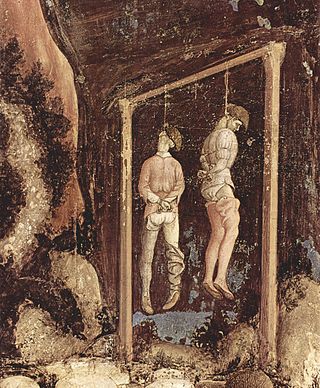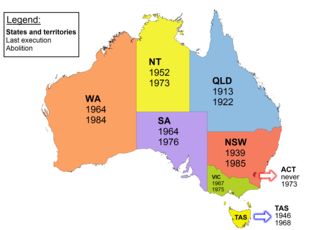
Execution by firing squad, in the past sometimes called fusillading, is a method of capital punishment, particularly common in the military and in times of war. Some reasons for its use are that firearms are usually readily available and a gunshot to a vital organ, such as the brain or heart, most often will kill relatively quickly.

Hanging is killing a person by suspending them from the neck with a noose or ligature. Hanging has been a common method of capital punishment since the Middle Ages, and is the primary execution method in numerous countries and regions. The first known account of execution by hanging is in Homer's Odyssey. Hanging is also a method of suicide.

Penal transportation was the relocation of convicted criminals, or other persons regarded as undesirable, to a distant place, often a colony, for a specified term; later, specifically established penal colonies became their destination. While the prisoners may have been released once the sentences were served, they generally did not have the resources to return home.

Albert Pierrepoint was an English hangman who executed between 435 and 600 people in a 25-year career that ended in 1956. His father Henry and uncle Thomas were official hangmen before him.

In the United States, capital punishment is a legal penalty throughout the country at the federal level, in 27 states, and in American Samoa. It is also a legal penalty for some military offenses. Capital punishment has been abolished in 23 states and in the federal capital, Washington, D.C. It is usually applied for only the most serious crimes, such as aggravated murder. Although it is a legal penalty in 27 states, 20 states currently have the ability to execute death sentences, with the other seven, as well as the federal government, being subject to different types of moratoriums.

HM Prison Wandsworth is a Category B men's prison at Wandsworth in the London Borough of Wandsworth, South West London, England. It is operated by His Majesty's Prison Service and is one of the largest prisons in the UK.
Capital punishment in Canada dates back to Canada's earliest history, including its period as a French colony and, after 1763, its time as a British colony. From 1867 to the elimination of the death penalty for murder on July 26, 1976, 1,481 people had been sentenced to death, and 710 had been executed. Of those executed, 697 were men and 13 women. The only method used in Canada for capital punishment of civilians after the end of the French regime was hanging. The last execution in Canada was the double hanging of Arthur Lucas and Ronald Turpin on December 11, 1962, at Toronto's Don Jail. The National Defence Act prescribed the death penalty for certain military offences until 1999, although no military executions had been carried out since 1946.

HM Prison Manchester is a Category A and B men's prison in Manchester, England, operated by His Majesty's Prison Service. It is still commonly referred to as Strangeways, which was its former official name derived from the area in which it is located, until it was rebuilt following a major riot in 1990.

Clive Adrian Stafford Smith is a British attorney who specialises in the areas of civil rights and working against the death penalty in the United States of America. He worked to overturn death sentences for convicts, and helped found the not-for-profit Louisiana Capital Assistance Center in New Orleans. By 2002 this was the "largest capital defence organisation in the South." He was a founding board member of the Gulf Region Advocacy Center, based in Houston, Texas.

Edward Earl Johnson was a man convicted in 1979 at the age of 18 and subsequently executed by the U.S. state of Mississippi for the murder of a policeman, J.T. Trest, and the sexual assault of a 69-year-old woman, Sally Franklin. Throughout his eight years on death row, he continued to plead his innocence. Johnson was executed by gas chamber.
Antonio G. James was an American murderer. He was tried and executed in Louisiana for the murder of Henry Silver. James claims to have not been the murderer in the event and held that conviction to his death. This case is notable not for any unusual or intrinsic aspect, but for being one of the few such cases that ever comes to the attention of the general public.

Capital punishment is a legal penalty in Japan. In practice, it is applied only for aggravated murder, but the current Penal Code and several laws list 14 capital crimes, including conspiracy to commit civil war; conspiracy with a foreign power to provoke war against Japan; murder; obstruction of the operation of railroads, ships, or airplanes resulting in the death of the victim; poisoning of the water supply resulting in the death of the victim; intentional flooding; use of a bomb; and arson of a dwelling; all resulting in the death of the victim. Executions are carried out by long drop hanging, and take place at one of the seven execution chambers located in major cities across the country.

Capital punishment is a legal penalty in Russia, but is not used due to a moratorium and no death sentences or executions have been carried out since 2 August 1996. Russia has had an implicit moratorium in place since one was established by President Boris Yeltsin in 1996, and explicitly established by the Constitutional Court of Russia in 1999 and reaffirmed in 2009.

Capital punishment in Australia has been abolished in all jurisdictions since 1985. Queensland abolished the death penalty in 1922. Tasmania did the same in 1968. The Commonwealth abolished the death penalty in 1973, with application also in the Australian Capital Territory and the Northern Territory. Victoria did so in 1975, South Australia in 1976, and Western Australia in 1984. New South Wales abolished the death penalty for murder in 1955, and for all crimes in 1985. In 2010, the Commonwealth Parliament passed legislation prohibiting the re-establishment of capital punishment by any state or territory. Australian law prohibits the extradition or deportation of a prisoner to another jurisdiction if they could be sentenced to death for any crime.
Death row, also known as condemned row, is a place in a prison that houses inmates awaiting execution after being convicted of a capital crime and sentenced to death. The term is also used figuratively to describe the state of awaiting execution, even in places where no special facility or separate unit for condemned inmates exists. In the United States, after an individual is found guilty of a capital offense in states where execution is a legal penalty, the judge will give the jury the option of imposing a death sentence or life imprisonment without the possibility of parole. It is then up to the jury to decide whether to give the death sentence; this usually has to be a unanimous decision. If the jury agrees on death, the defendant will remain on death row during appeal and habeas corpus procedures, which may continue for several decades.
The Execution of Gary Glitter is a 2009 British television drama, produced by Juniper Communications Limited and broadcast on Channel 4 in the UK. Set in a parallel Britain, the film follows an imaginary trial and execution by hanging of former glam rock singer Gary Glitter, who has been convicted for possession of child pornography and rape of minors, for "offences against children". The programme was written, produced, and directed by Rob Coldstream, and was broadcast on 9 November 2009.

Capital punishment is a legal penalty in the U.S. state of Mississippi.
Capital punishment in Afghanistan is legal and could be carried out secretly or publicly. The convict could be hanged or shot to death. Stoning, amputation, and flogging were also sometimes used as a method for punishment, especially during the late 1990s. Public executions have existed throughout Afghanistan's history. They have continued with the Taliban returning to power in August 2021. Some executions were recently condemned by the United Nations. The capital offenses in Afghanistan generally include heinous crimes such as mass murder and are governed by Sharia, along with civil laws.

Into the Abyss is a 2011 documentary film written and directed by Werner Herzog. It is about capital punishment, and focuses on a triple homicide that occurred in Montgomery County, Texas, in 2001. In the film, Herzog interviews the two young men convicted of the crime, Michael Perry and Jason Burkett, as well as family members and acquaintances of the victims and criminals, and individuals who have taken part in executions in Texas. The primary focus of the film is not the details of the case or the question of Michael and Jason's guilt or innocence, and, although Herzog's voice can be heard as he conducts the interviews, there is a minimal amount of narration, and he never appears onscreen, unlike in many of his films.
Interviews Before Execution is a Chinese television talk show which was aired on the Henan Legal Channel in the country's Henan Province between 2006 and 2012. Presented by journalist Ding Yu the programme featured interviews with people convicted in cases of violent murder who were offered a chance to tell their story while under sentence of death. The interviews were conducted shortly before the offender was due to be executed – often within a few hours of the punishment being carried out. The show's purpose was to deter other potential criminals from committing similar offences by showing them the consequences of such actions.













